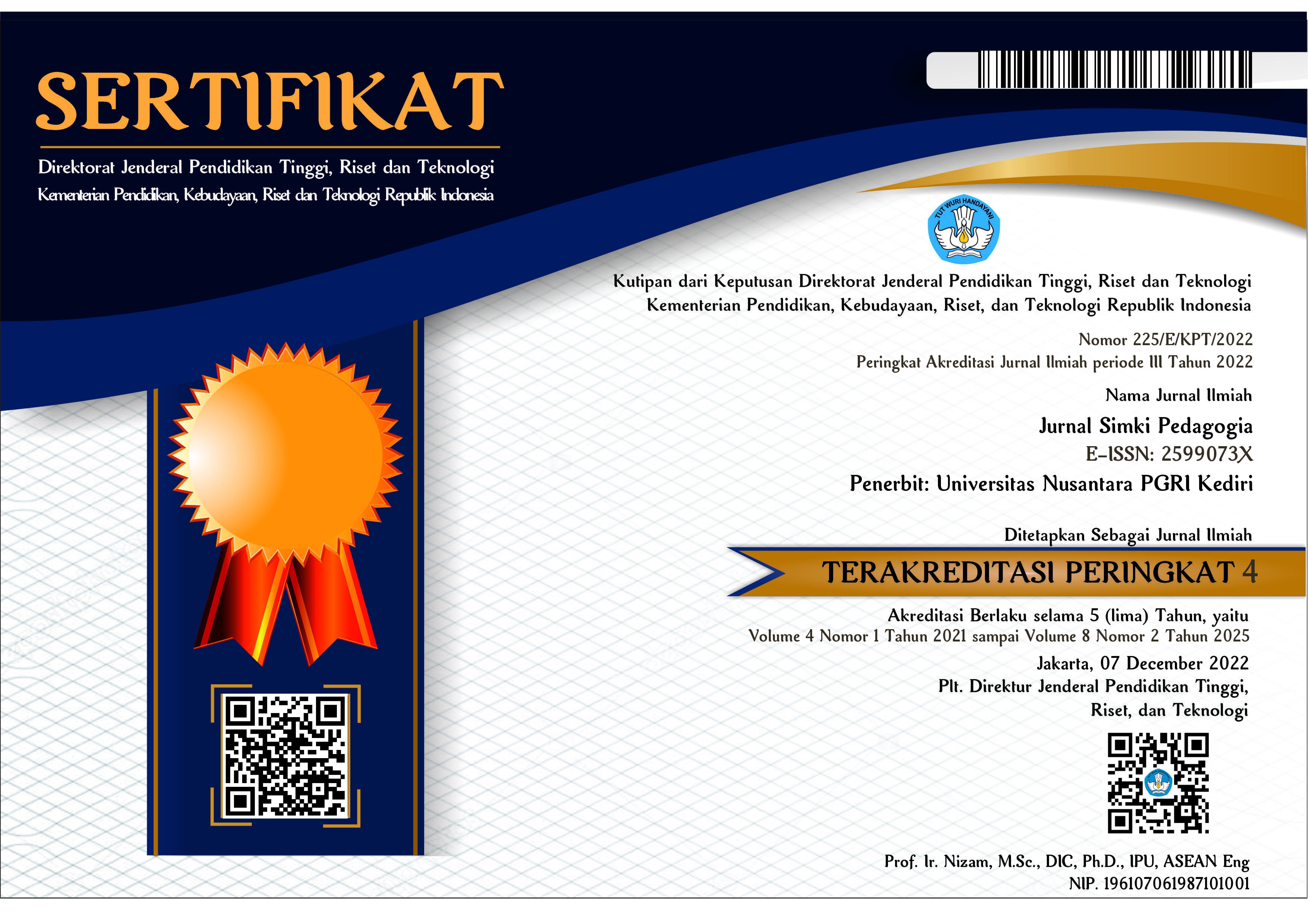The Phonics Method to Increase English Pronunciation for Young Learners
 Abstract views: 1044
,
Abstract views: 1044
,
 PDF downloads: 974
PDF downloads: 974
Abstract
The purpose of this study was to solve the problem of fifth-grade students at SDN Ciwidey Kota that still low in pronunciation skills. Their English pronunciations are still considered inadequate, as seen by an average score of 52.85. This study design is Classroom Action Research (CAR). The data gathering approaches employed included an oral test, which is read aloud simple descriptive text, interviews with students and teachers, and field notes. In this study, the phonics method was employed to improve students' pronunciation skills through classroom activities. This study was carried out in two phases. The first cycle showed no significant improvements, however there was some improvement with an average score of 62.92. Cycle two was consequently required, and it showed remarkable improvement with an average score of 80.17. In short, the findings of this study suggest that the phonics method can improve students' English pronunciation skills and boost students' confidence in pronouncing a word in English. Then, during the learning process, a more effective strategy for students' pronunciation was discovered by applying the phonics method.
Downloads
References
Agustine, D., Arvianti, I., & Heriyanto, E. (2022). The Improvement Of Mispronunciation Encountered By Most Young English Learners. Jurnal CULTURE (Culture, Language, and Literature Review), 9(1), 94–118. https://doi.org/10.53873/culture.v9i1.243
Asrul, N., & Husda, A. (2022). Enhancing Pronunciation Skills Through Phonetic Method. AL-ISHLAH: Jurnal Pendidikan, 14(3), 4167–4176. https://doi.org/10.35445/alishlah.v14i3.394
Blevins, W. (2006). Phonics from A to Z: A practical guide (2nd ed). Teaching Resources/Scholastic.
Celce, M., & Murcia. (2001). Teaching English as a Second or Foreign Language (3rd ed).
Gilakjani, A. P. (2016). English Pronunciation Instruction: A Literature Review. International Journal of Research in English Education, 1(1). http://ijreeonline.com/article-1-21-en.html
Hişmanoğlu, M. (2006). Current Perspectives on Pronunciation Learning and Teaching. 2(1), 101–110. https://www.jlls.org/index.php/jlls/article/view/26
Hismanoglu, M., & Hismanoglu, S. (2011). Internet-Based Pronunciation Teaching: An Innovative Route Toward Rehabilitating Turkish Efl Learners’ Articulation Problems.
Karlina, Y., Rahman, A., & Chowdhury, R. (2020). Designing Phonetic Alphabets for Bahasa Indonesia (PABI) for the teaching of intelligible English pronunciation in Indonesia. Indonesian Journal of Applied Linguistics, 9(3), 726–734. https://doi.org/10.17509/ijal.v9i3.23223
Sahara. (2019). Improving Students’ Pronunciation by Applying A Phonics Method in The Classroom at The Eighth Grade Students of UPT SMPN 6 Satap Malangke. IAIN Palopo. http://repository.iainpalopo.ac.id/id/eprint/1105/
Kurniati, V., Wijaya, B., & Suhartono, L. (2015). Improving Students’ Pronouncing Ability Using Phonics. https://dx.doi.org/10.26418/jppk.v7i1.23737
Paris, A. S. (2019). Phonics Approach in Teaching Reading. International Journal of Multicultural and Multireligious Understanding, 6(3). http://dx.doi.org/10.18415/ijmmu.v6i3.739
Purohman, P. S. (2018). Classroom Action Research Alternative Research Activity for Teachers.
Sarıçoban, A., & Kuç, A. (2010). Teaching problematic consonants in English to young learners. Procedia - Social and Behavioral Sciences, 2(2), 943–947. https://doi.org/10.1016/j.sbspro.2010.03.131
Scott, W. A., & Ytreberg, L. H. (1994). Teaching English to Children. London: Longman.
Tiyas, R. F., & Aniuranti, A. (2023). The Implementation Of The Phonics Method To Enhance The Young Learners’ English Pronunciation. 3(1). https://jurnal.unupurwokerto.ac.id/index.php/esochum/article/view/188
Zhang, F., & Yin, P. (2009). A Study of Pronunciation Problems of English Learners in China. Asian Social Science, 5(6), p141. https://doi.org/10.5539/ass.v5n6p141
Copyright (c) 2024 Wahyu Satya Gumelar, Tyara Sucia Lestari

This work is licensed under a Creative Commons Attribution 4.0 International License.

Jurnal Simki Pedagogia : https://jiped.org/index.php/JSP/index is licensed under a Creative Commons Attribution 4.0 International License.
















